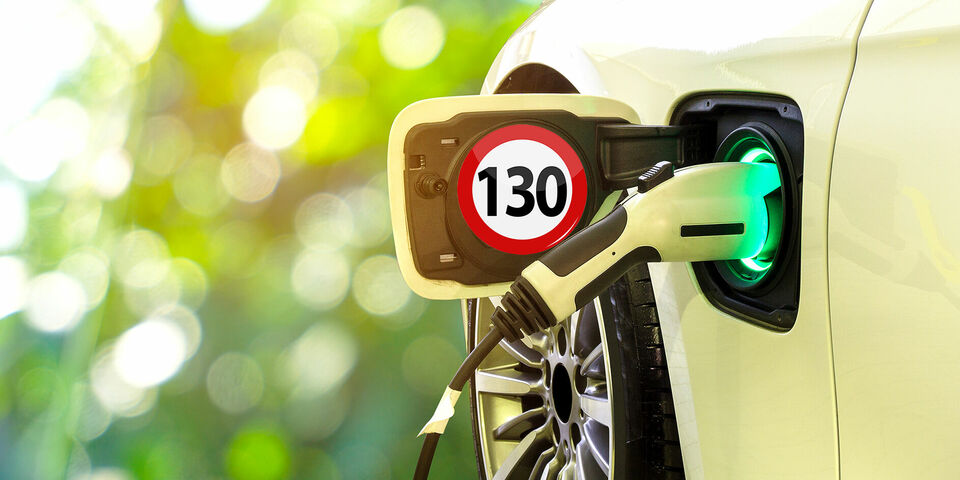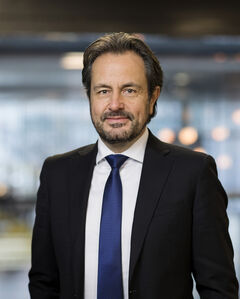Prof Talk | Reward electric car with 130
In order to cut nitrogen emissions, the speed on Dutch motorways will be reduced as of mid-March to 100 kilometers an hour. Excellent, says Next Nature Network director and TU/e University Fellow Koert van Mensvoort, but let's make an exception for motorists driving zero-emission electric cars. He has started a petition urging that sustainable conduct be rewarded. Unfortunately, Carlo van de Weijer, director of the TU/e Strategic Area Smart Mobility, sees numerous practical constraints.
In a nutshell: In May of this year the Council of State ruled that the Nitrogen Approach Program could no longer be used to justify the granting of permits for ‘activities that cause the additional emission of nitrogen’. This means no new sections of motorways and no upsizing of cattle farms, and it has brought to a halt thousands of construction projects. In order to get house building going again quickly, the Dutch cabinet recently opted to reduce the maximum daytime speed on motorways from 130 to 100 kilometers per hour, a compensatory measure to bring down nitrogen emissions.
“Reducing driving speeds to tackle the nitrogen problem, it's a good plan,” says Koert van Mensvoort, philosopher and University Fellow Next Nature at the Department of Industrial Design. “But as it now stands, it's going to affect cars that aren't even causing any emissions. This measure lends itself perfectly to turning things around: rewarding the sustainable option. Because sustainability is almost always associated with frugality, being economical, Calvinism. The woolly-pully brigade. For once, let's seize the chance to show sustainability in a positive light.”
Petition
With a petition, Van Mensvoort hopes to keep the electric motorist beyond the reach of the speed reduction, and chiefly to make the image of sustainability a topic of debate. This is working, even if the discussion is mostly about the 130 km/h proposal itself. For example, Carlo van de Weijer, director of Smart Mobility TU/e, has called the idea “impracticable”, although he certainly agrees with encouraging good behavior. “Reserving a lane for electric cars travelling at 130 km/h represents a huge drop in capacity on the busy Dutch motorways. Unlike in Austria - where the dynamic speed limits don't apply to electric vehicles - here such an exception would indeed create major problems. And I haven't even mentioned safety issues and the increase in noise.”
Van Mensvoort concurs that the idea's implementation would need careful thought. Nonetheless there are certain places where, if need be, an entire lane could be set aside for 130 km/h. “Look at the A2 between Amsterdam and Utrecht, it's wide enough to land a plane. A few places would be better than nothing, after all it's a matter of principle: should this nitrogen reduction measure apply equally to electric cars? And as for safety: we have cars and all our freight traffic driving at 80 km/h, that's a big difference in speed.”
Traffic safety
According to Van de Weijer, this a huge oversimplification. “Traffic safety is a complex subject. At a lower average speed and with less difference in speed, the likelihood of fatal accidents is significantly reduced. On the other hand, people who are driving slowly might get bored more easily and be tempted to reach for their mobile phones. Or motorists may be more likely to take shortcuts over provincial roads, which are a whole lot less safe than the motorway. How it all adds up and which is the safer option is open to discussion.”
And, Van de Weijer emphasizes, most electric drivers don't even want to drive at 130 kmh. “In an electric car you are confronted with your fuel consumption, you are engaged in a competition, as it were, with your own car. The faster you drive, the less economically you drive. That's why you never see electric motorists going at full pelt. Drive a little more slowly and you'll certainly be able to drive farther.” Van Mensvoort wants to give the driver the choice: “'You don't have to' is different from 'You can't'. I don't drive electric - I usually take the train -, so I'm not someone in a beast of a Tesla shouting about wanting to drive faster. But the people who have an electric car at the moment are actually paying too much because they are paying to make the infrastructure, factories, and production chain possible. Can't we let them enjoy themselves once in a while? Electric driving is the future. So let's encourage our new sacred cow in any way we can.”




Discussion